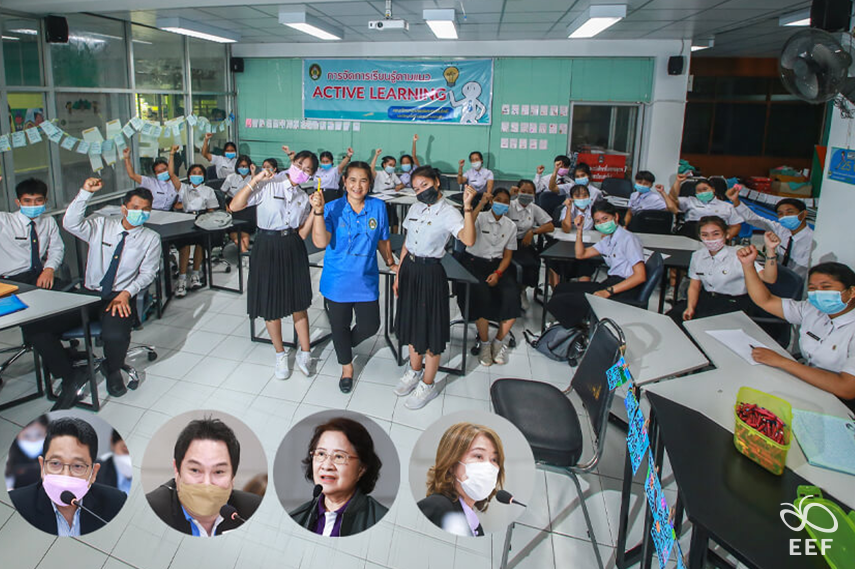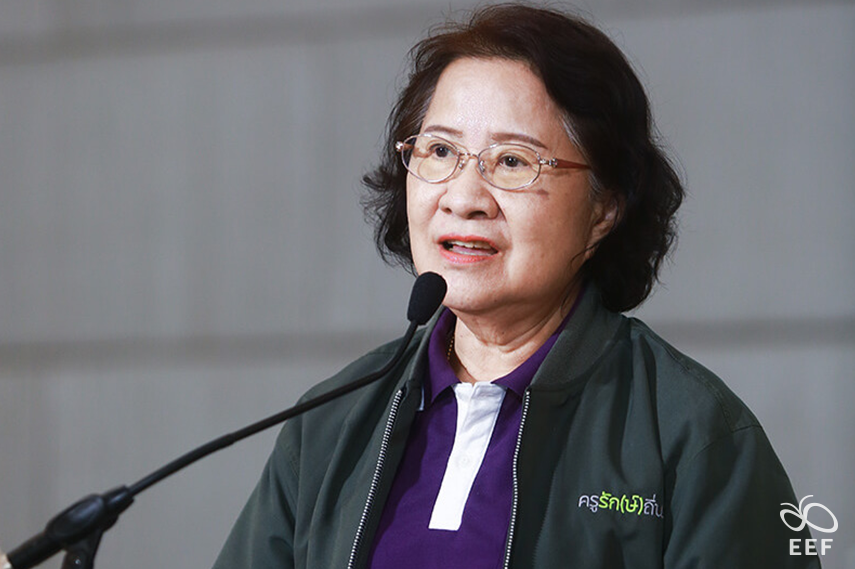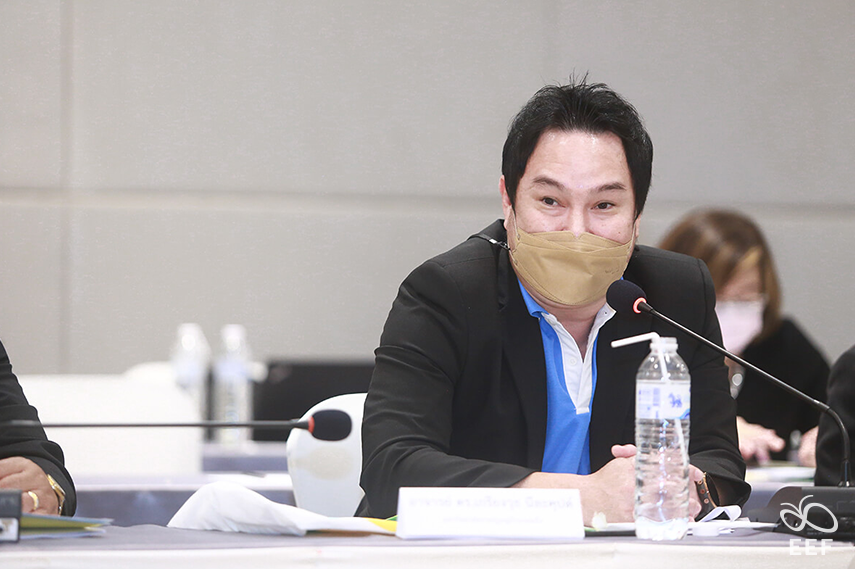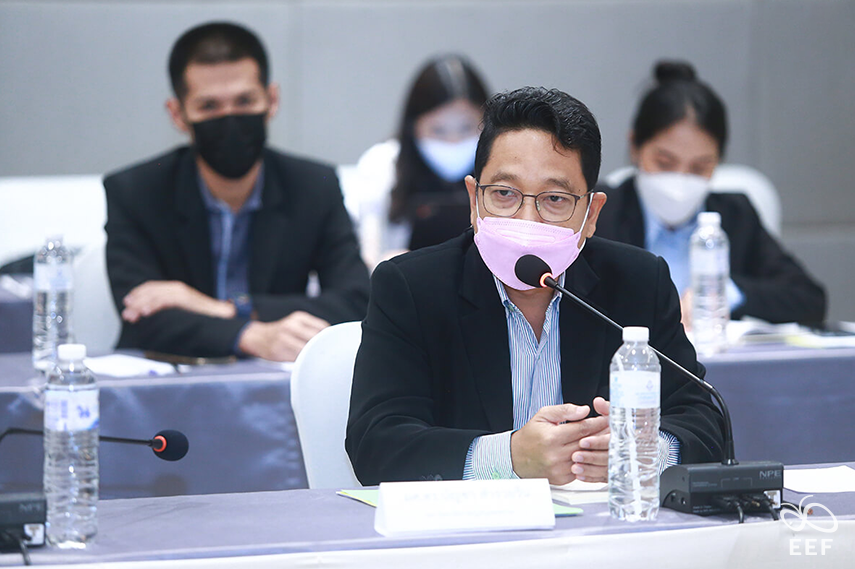
Good teachers who understand children do not stick for very long because they cannot adapt themselves to the communities.
Teachers with a pre-school degree have to teach primary school as well.
After 4 years of grooming teachers in the universities, they lose their passion and pursue another career field.
Those problems seem to be prevalent throughout the history of teacher development even though they are the main problems that need to be fixed in order to eliminate educational inequity and make quality education accessible to children in all areas of the country regardless of the distance and condition.
In 2019, the EEF established local networks to find high school graduates who wish to become teachers in their hometowns. With the help of teachers’ colleges, communities and local schools, we came up with study courses particularly designed for the local environments to build those young ones to become full-fledged teachers with full knowledge of the local traditions. It has become the guideline for producing community teachers that are ready to work or “the right teachers” under the “Home Grown Teachers” project.
So far, the Home Grown Teachers project has supported 3 generations of students in 16 pilot schools and 696 destination schools including 866 students in 54 provinces nationwide along with newly established study courses.
Asst. Prof. Dr. Daranee Utairatanakij, Honorary Committee of EEF stated that the students in the Home Grown Teachers project would play a key role in improving schools in remote areas as they were embarking on a journey to fulfill their dreams of graduating an education or teaching degree and returning home as community teachers despite the fact that they came from underprivileged families. Moreover, they would be solid proof that one scholarship could build a potential teacher who would return home to build hundreds or thousands of other children to become competent manpower of the future.
 “The Home Grown Teachers project aims to build a solid foundation in remote areas of the country where underprivileged children with potential and dreams of becoming teachers are waiting for an opportunity to study a course that will equip them with academic and professional skills enough to conduct high-quality teaching as community teachers who are committed to providing quality education for children and reducing educational inequity in remote areas.”
“The Home Grown Teachers project aims to build a solid foundation in remote areas of the country where underprivileged children with potential and dreams of becoming teachers are waiting for an opportunity to study a course that will equip them with academic and professional skills enough to conduct high-quality teaching as community teachers who are committed to providing quality education for children and reducing educational inequity in remote areas.”
“The Home Grown Teachers project will drive a policy change by creating and developing community teachers who understand the local traditions and needs through study courses designed by strong local networks that focus on the children and transforming teachers to meet the demand of local education and adapt themselves to the ever-changing society.”
As the Home Grown Teachers project is going to accept schools nationwide to participate in producing 4th generation student teachers (the academic year 2023) from June 21 – July 20, 2022, we will see how each pilot school comes up with interesting innovations or courses that reflect the process change after 3 years.
“Teachers must adapt their knowledge to the local lifestyle and limitations”
Asst. Prof. Dr. Kiatsuda Srisuk, Education Science Dean, Chiang Mai University stated that attempts to solve educational problems in the past never took local limitations into consideration. Therefore, the institution improved the process of producing and developing teachers by integrating sciences with local lifestyles. The study courses were designed from the surroundings of the students and limitations of the destination schools to where the student teachers would be assigned.
 “The Home Grown Teachers project helps speed up the university’s process. During the 3 years, we worked with the communities and destination schools until we saw limitations in different aspects that we brought back to design specific courses based on the actual needs. We think it is an important tool that will lead to educational security, food security, safety and well-being of local communities because these new generation teachers will see the real problems and find the right solutions as they work in the areas with their knowledge and skills built specifically to tackle such local problems through 4 years in the universities.”
“The Home Grown Teachers project helps speed up the university’s process. During the 3 years, we worked with the communities and destination schools until we saw limitations in different aspects that we brought back to design specific courses based on the actual needs. We think it is an important tool that will lead to educational security, food security, safety and well-being of local communities because these new generation teachers will see the real problems and find the right solutions as they work in the areas with their knowledge and skills built specifically to tackle such local problems through 4 years in the universities.”
Preschool – Primary School
A dual degree program as a solution to the lack of teachers
Professor Dr. Kriangwuth Neelakupt, Dean of Faculty of Education, Ban Chom Bung Rajabhat University stated that the Home Grown Teachers project helped change the way teachers were produced right from where it started. The university changed from working passively to actively seeking under-privileged children in remote areas. Once potential students were found, the institution would design a development plan with the destination communities and schools to ensure that the 4 years in the university would fully equip the students for them to become teachers with the qualifications that meet the demands of the communities where the teachers would be instantly assigned.

“Giving an opportunity for students to be trained in the actual places is a game changer that enables the university to design courses according to the local limitations.”
“After enrolling in the project, the students can choose to improve skills of their choice. From the training in the actual places of the 1st generation teachers of the Home Grown Teachers project, we found a problem at the preschool level where the number of teachers was not enough to fill the classes. As a result, the preschool teachers had to cover the primary school classes also. Therefore, the university modified the course to an enrichment program where students may elect to study the pre-school field and primary school field at the same time both for practical skills and additional credit accumulation to obtain a dual degree.”
“The Right Teachers” for communities
Asst. Prof. Dr. Bancha Samrouyruen, Dean of Faculty of Education, Rajabhat Pibulsongkram University, stated that the Home Grown Teacher project came at the right time and right place because there were many changes in education, especially the “Big Rock” project that aimed to drive the learning process to directly reflect the teacher productions. That was why the university adjusted its teacher development courses according to the plan by focusing on how a teacher could return to their hometown to conduct teaching and what skills would they need to possess.
 “We developed a proficiency-based teaching approach to ensure that the students will be able to teach immediately after obtaining the degree without any additional training or adjustment period in the destination communities. They should be able to conduct teaching on a full scale, analyze, design study plans, serve the communities, possess technological knowledge, develop skills for children and conduct community improvement activities. All of this will only be possible if the producing institutions provide flexible courses that can be adjusted annually according to the local limitations and changes in the world situation.”
“We developed a proficiency-based teaching approach to ensure that the students will be able to teach immediately after obtaining the degree without any additional training or adjustment period in the destination communities. They should be able to conduct teaching on a full scale, analyze, design study plans, serve the communities, possess technological knowledge, develop skills for children and conduct community improvement activities. All of this will only be possible if the producing institutions provide flexible courses that can be adjusted annually according to the local limitations and changes in the world situation.”
“For the academic year 2023, we have been preparing an additional course called the “Teachers Who Build Innovators” for the 4th generation students of the future. They will be able to work and earn income while studying as we forecast that the COVID-19 situation will continue to exist for years.”
All of this is the collaboration between EEF and teacher-producing institutions in the country aiming to build community teachers who are ready out of the box by seeking the right persons and providing what they need to bring out their potential through new courses designed by the institutions. As a result, we will have qualified homecoming teachers to improve their local communities. Eventually, not only 1,500 homecoming teachers that we will get from the project but nationwide educational evolution and teacher-production improvements which are part of the national development in the long run.

